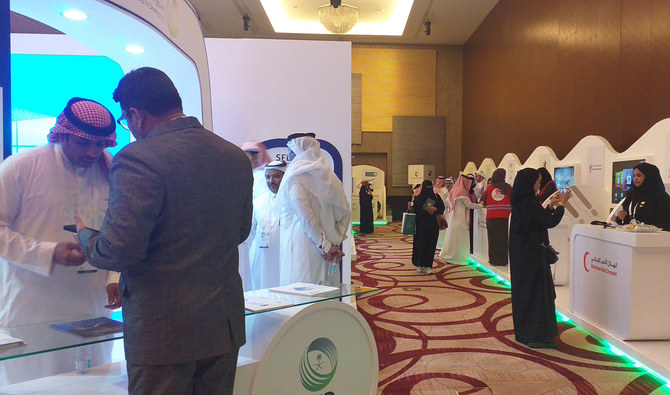RIYADH: The 2nd Riyadh International Humanitarian Forum ended on Monday with a commitment to use all available policy resources to reduce the risks and threats to the vulnerable victims of natural disasters and conflicts.
The two-day event featured five panel discussions and a number of other sessions, including a review of developments and global trends in humanitarian initiatives. The aim was to identify ways to improve processes and ways of working that some participants described as out of date and in need of modernization.
“The humanitarian system is antiquated and obsolete,” said David Harden, the managing director of Georgetown Strategy Group, during a session on evidence-based professional practice in humanitarian intervention. “I find it impossibly difficult to break through the procurement process, the bureaucracy and the slowness. They tend to buy process and projects; they don’t tend to buy results.”
Bogdan Dumitru, the senior director of international programs for International Medical Corps, said: “Front lines today are very flexible. They can change overnight. Our capacity remains unfortunately somewhere in the area of the 1980s.”
Trey Hicks, director of the Office of Food for Peace in the Bureau for Democracy, Conflict and Humanitarian Assistance at the United States Agency for International Development. said: “More than 200 million people are affected by some sort of humanitarian crisis. More than 70 million people are on the run from some sort of humanitarian crisis. The challenges of today aren’t the same sort of crises as those when our humanitarian systems were set up.”
Ibrahima Soce Fall, the World Health Organization’s assistant director general for emergency response, said that 70 percent of communicable-disease cases affect people in fragile areas. Conflict is the reason, he added, as it deprives people of access to proper health facilities. The keys to tackling the problem are information sharing and coordination, he said.
Referencing the most recent, and ongoing, global health crisis, Carl Skau, head of the Swedish Foreign Ministry’s department of conflict and humanitarian affairs, said: “We strongly support the World Health Organization in its efforts to combat the (coronavirus) outbreak. WHO has a lead role in combating epidemics.”
He added that coronavirus is a current priority but action is needed to control all communicable diseases. He also pointed out that women and children need special assistance in crisis areas.
Organized by the King Salman Humanitarian Aid and Relief Center (KSRelief), in partnership with the UN and under the auspices of King Salman, the forum concluded by presenting its recommendations for a “Humanitarian Development Nexus.”
These included the implementation of commitments made by the UN General Assembly for reforms of the UN development system. These include improvements to funding, management accountability, and the UN Sustainable Development Framework, to strengthen collaboration in the humanitarian, development and peace efforts.
The forum called for improved humanitarian and development collaboration under the auspices of the Joint Steering Committee led by the UN Office for the Coordination of Humanitarian Affairs and the UN Development Program, to promote more coherent and efficient humanitarian and development action during crises and transitions to long-term sustainable development.
In addition, it recommended inclusive collaboration between humanitarian, development and peace advocates and communities to reduce the risks to people in troubled areas, and their levels of need.
As part of its recommendations on “health in a humanitarian context with a focus on communicable diseases,” the forum advocated the use of the sustainable development goals as a tool to support integrated, collaborative approaches to sharing critical information generated by early-warning systems, to help ensure early interventions and more effective disease control by all health agencies.
In response to the “large-scale migration flows from Africa across the seas to the Gulf states and Europe in humanitarian settings,” the forum recommended steps be taken to improve understanding of the scope of the migration problem, including the interconnected causes, trends and vulnerabilities. It also advised the consideration of positive practices that can be implemented in countries of origin, transit and destination to better control large-scale migration flows.
The contributors to the forum expressed a hope that the discussions in Riyadh would contribute to the Global Compact for Safe, Orderly and Regular Migration, and to Sustainable Development Goal 10.7, which aims to facilitate the orderly, safe and responsible migration and mobility of people.
While considering the requirements of women, children and people with disabilities during humanitarian crises, the forum said that increased investment and multisector support for young people and caregivers have immediate and lasting effects on the protection and advancement of child rights and the creation of future peaceful and stable societies. It added that investment in early childhood is imperative for the fulfillment of obligations under the Convention on the Rights of the Child and the Convention on the Rights of Persons with Disabilities, and to help achieve sustainable development goals.
The forum also called for investment in the development of projects for people with disabilities in conflict and disaster zones to help them become more integrated them with their communities.
On the sidelines of the of the forum, an exhibition was mounted to showcase the work of humanitarian and UN organizations.

















